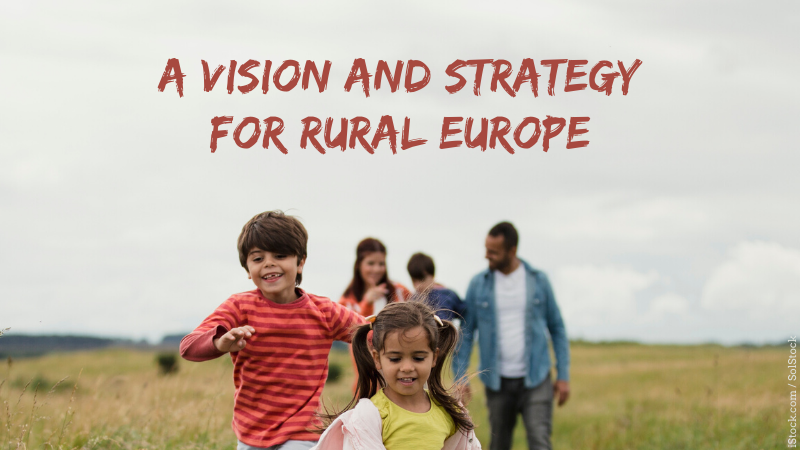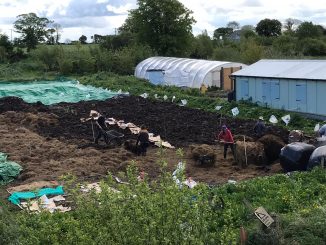A just and sustainable Europe will not be possible without rural considerations being properly integrated into the plans for Covid-19 recovery, for CAP and for the EU Green Deal. ARC2020 and our colleagues around Europe have worked for some time on developing a coherent vision for Rural Europe.
We call on rural civil society to work with us on further developing a vision and strategy for rural Europe. We cannot do it alone – we must, and we should, work together. So we invite you to read what’s below – a draft working document on a vision and strategy for rural Europe – and then join with us to further develop and refine it, in the days, weeks and months ahead. Together we ourselves must develop our way of working together, to present a coherent voice to represent rural Europe.
Call – Vision and Strategy for a Transition towards a more “resilient, sustainable and fair Europe”.
European Institutions and European citizens in rural and in urban areas will work together to:
- Build a new partnership between rural and urban communities. COVID-19 has revealed the underlying fragility of Europe’s large metropolitan centres and of missing territorial ties with their rural neighbourhoods. With strict and long confinement, millions of Europeans have grasped for the first time how much their lives depend on well-functioning farming, food, resource and service supply systems both in cities and rural areas. With closed borders and restricted mobility, farmers, villages and rural communities feel the need for closer territorial connections. A long-term rural – and urban- vision for Europe, must create new structures for closer cooperation, including territorial planning, basic services, education, capacity building, investments and coordinated action, taking care for both – people and the planet – in both, rural and urban areas.
- Harness the full potential of rural areas in the digital transition. In times of COVID-19, the need for improved communication, consultation, research, exchange of good practices and inclusive governance has clearly emerged. Digital innovations have proved to be essential to cope with many of the impacts of the crisis but will be equally important for preparing times of recovery and reorganisation of rural- urban relations. Innovations in sustainable mobility, decentralized energy production, work and service provision also offer huge opportunities for rural areas. New hard and soft investments need to be co-designed with rural communities to reflect their needs and to seize these opportunities.
- Empower rural people to become key drivers in all aspects of a comprehensive EU Green Deal. Rural territories and communities can make an important contribution to global economic, environmental and social challenges – in terms of food security, equality, water, energy, biodiversity and climate change. The circular economy and ecosystem services of all kinds – needs to be recognised, valued and enhanced. There is no serious argument to water down ambitions of the European Green Deal in the light of COVID-19. On the contrary, the crisis is a chance to dig deeper into the real challenges of an eco-fair transition and the role European Institutions and citizens shall play.
- Launch the transition to sustainable food systems offering farmers and farm workers as well as urban citizens fair conditions for adapting to the transition while ensuring fair basic incomes and social and health security. The Farm to Fork strategy should act as a guideline for those principles, instead of feeding global “engines of growth and jobs” which so far have extracted our food, water, energy and workforce from the countryside – both in Europe and abroad – without due consideration for the environmental and social cost. The Farm to Fork strategy should feed into the EU Green Deal with process-based indicators and proofing of delivery for sustainable practices in food and rural ecosystems.
- Strengthen the role of rural communities in a more resilient and fair recovery. The economic, social and environmental contribution that rural areas can make to the wellbeing of society as a whole must also be recognised and enhanced in every aspect of recovery plans and other long-term EU strategies. In the current context, the quality of life in rural areas can become an asset which attracts many more people – both young and old. But this requires innovative solutions and investments in basic services, entrepreneurship, adequate safety nets and policies to fight poverty and social exclusion. Given the right conditions rural communities can play a key role in developing healthier, more caring, inclusive and resilient ways of living for many people. Rural communities should be strongly supported to monitor hydro-geological and environmental degradation and to carry out precautionary measures against floods, erosion, fires, crop failures and desertification.
From vision to action. Ensuring ownership.
- While the European long-term vision for rural areas should be supported by evidence and expert opinion, it must ultimately be rooted and emerge upon the needs and aspirations of rural people themselves – as well as the views of urban citizens. Rural communities must be empowered to create and implement their own local visions within a balanced bottom-up and top-down development and governance process.
- Consultations and dialogue must recognise the diversity of rural stakeholders and rural areas in different parts of Europe and their specific territorial rural-urban ties. The EU vision must go beyond fatalistic accounts of existing problems and the idealistic wish lists of beneficiaries – which have already been gathered in various fora in the past but have not yet been realised.
- The EU long-term vision should reflect the results of collective exercises carried out by different rural communities across Europe to imagine what their future could be in 2040. It should also take account of the perspective from urban communities. While these grass-roots level reflections must adapt to their specific circumstances, the five points mentioned above can provide a common starting point and framework.
- For rural stakeholders to engage enthusiastically in the process of creating a EU long-term vision, they must receive assurance that their ideas will have an impact on their lives in the short term – even if the vision itself is a long-term goal. Action must be taken now to show that the vision will not gather dust in the long period between one programming period and the next – by creating the conditions and ensuring links with the future programming period (see the following sections)
- The European long-term vision for rural areas should include the Western Balkan countries as part of Europe, immediate EU neighbours and potential EU members. They could have an important contribution in the transition towards a more “resilient, sustainable and fair Europe” through: building partnerships between rural and urban communities, embracing digital innovations in rural areas, dealing with economic, environmental and social challenges, building sustainable food systems, developing healthy, balanced and resilient way of living in the rural areas of the Western Balkans, as part of Europe.
Creating the conditions for a European long-term vision for rural areas
- Establish the EU governance systems and policy leadership for driving the long term vision Despite its strong sectoral focus and responsibilities, the Directorate General for Agriculture and Rural Development of the European Commission has the longest track record of supporting the smaller, diverse projects that characterize much of rural development. This potential should be enhanced by explicitly recognizing and strengthening the role of CAP Strategic Plans for providing strategic coordination and smaller scale “seed” investments which create the conditions for larger investments in all socio-economic fields relevant for rural areas.
- A long term Rural Task Force, including the European Parliament and stakeholders from European civil society, should put into place an interdepartmental mechanism for impact assessment and coordination of all EU policies which impact rural areas (“rural proofing”). There needs to be a procedure whereby the proposals and recommendations emerging from the European Long Term Vision for Rural Areas are progressively translated into guidance, operational principles, incentives, procedures, criteria which guide both Member States and the Commission in the joint management of the future CAP Strategic Plans and Cohesion Policy in rural areas.
- In essence, all future EU support for investments and expenditure should strengthen the partnership with rural communities (as described above) and be directed away from unnecessary activities or those which actually put at risk the social and environmental fabric of rural areas, such as investments in large scale industrialized farming, based on per hectare payments.
- There needs to be a process for feeding recommendations and ideas emerging from the Long Term Vision for Rural Areas and ‘rural proofing’ into the implementation of the European Union’s macro-strategies such as the European Green Deal, the Digital Strategy and the future European recovery plan from COVID 19. They should also be fully reflected in the Country Specific Reports and recommendations of the European Semester.
Taking the first steps on the journey to the long term vision – in the next programming period
The vision must be translated into concrete objectives, targets and actions and progressively lead to an overarching policy framework or “rural agenda” which takes account of the important synergy with urban areas and which is resourced and developed through the same kind of institutional thematic working groups that exist for the urban agenda. These should develop policy recommendations in all the topics and fields of concern to rural areas (for example, the topics raised by the European Rural Parliament, RED, ELARD and other rural stakeholders, such as sustainable farming, repopulation, public and basic services, digitalisation, entrepreneurship, mobility, energy, youth, training etc)
- Following the Cork II Declaration, a rural agenda should propose a set of integrated policies which enable and empower rural communities to turn challenges into advantages such as decarbonisation, climate measures, digitalisation, generational change, integration of new entrants, social innovations, etc). The rural agenda should be built upon the success stories of the LEADER and CLLD approach of past decades.
- Among the immediate priorities will be policies for dealing with the loss of income and insecurity caused by the COVID crisis as well as longer term solutions for addressing depopulation and attracting new people to rural areas
- Existing funding streams for rural development should be brought together into coherent, integrated policy packages by earmarking and ringfencing the following areas: Pillar 2 of the CAP; Specific Objective 8 of the CAP for “vibrant rural areas”; funding for rural areas in the ERDF and ESF, funding for CLLD in the CAP Strategic Plans and all other funds, additional and complementary support for community led innovation such as that envisaged by Smart Villages.
- It is important to enhance the strategic role of CLLD in promoting inclusive structural changes, building community capacity to stimulate innovations as key drivers of a socially, environmentally sustainable and just transition in rural areas. In the new programming period, LAGs should not simply be seen as decentralized offices for distributing small grants but as partnerships for fostering real bottom-up resilience and a transition to a greener and fairer society.
- In order to ensure that local development strategies effectively empower local communities to achieve the changes mentioned above, the European Commission and Member States need to drastically simplify procedures and reduce bureaucratic burden. They should ensure the use of one lead fund and harmonised one stop shop solutions to improve multi-funded CLLD projects in both rural and urban areas (harmonised selection criteria and calls, simplified cost options, block exemptions from State Aid Rules, simplified application processes and eligibility conditions for small and civil society projects, and co-funding options for smaller projects by foundations and other agencies).
- There should be support for the transformation of AKIS (Agricultural and Knowledge Innovation Systems) into broader ARKIS (Agricultural and RURAL Knowledge and Information Systems) supported by rural community innovation brokers on a par with the innovation brokers for the food and agricultural sector. ARKIS should enlarge the scope for innovation in rural area to more key sectors and fields and be aligned with Horizon and other EU research and cooperation programmes.
- In this context, future cooperation measures should be flexible and open to all rural stakeholders and not conditional on the participation of one category. Current and future rural networks should play a central role in promoting integrated policy development for rural areas by all EU funds and have sufficient resources to provide hands-on support in key areas such as CLLD in rural, urban and coastal areas, other forms of cooperation, and the newer more challenging initiatives such as smart villages, social and digital innovation and eco-schemes.
Together these policies can start to realise the potential that rural areas have for offering a better quality of life – in both social, environmental and economic terms – for many more European citizens.
Download this as a PDF – Working document Vision and Strategy for Rural Europe ARC2020
More
Join Us in Generating a Vision & Strategy for Rural Europe – Now!






1 Trackback / Pingback
Comments are closed.